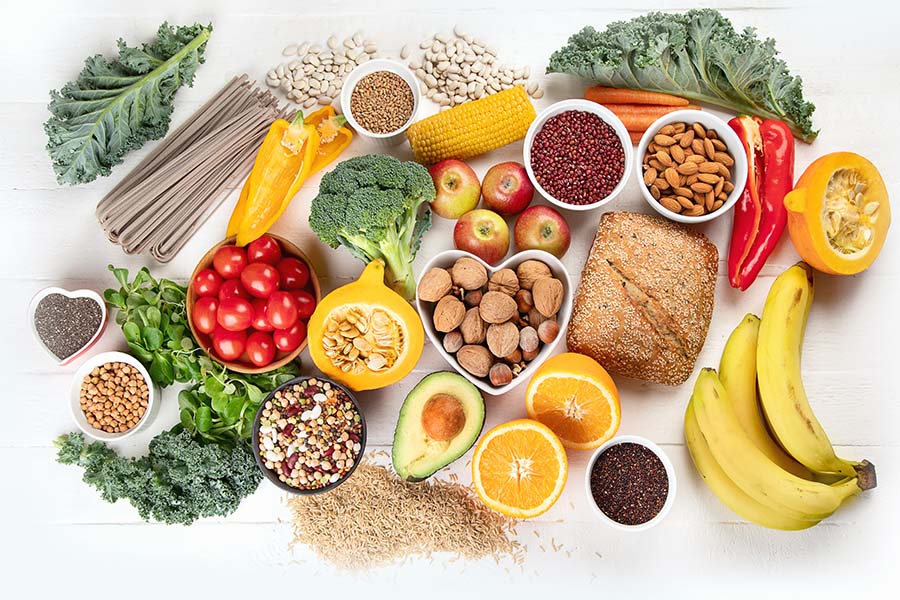Losing weight is hard because going without food is no fun. But did you know that there are some foods that can actually help you lose weight?
That's right! Some foods can speed up your metabolism and even help you burn fat. And one of the best things you can eat to lose weight is fiber.
Fiber is actually a carbohydrate that our bodies can't digest, so it passes through the system relatively quickly. This means it doesn't get stored as fat, like other types of carbs.
Fiber helps gut bacteria to thrive, and these gut bacteria are essential for keeping our gut healthy. They absorb nutrients, help break down food, and protect the gut from harmful bacteria.
In addition, they produce short-chain fatty acids, which have several remarkable health benefits, including reducing inflammation and improving gut health.
So, fiber not only helps you lose fat, manage weight and keep you full, but it also has numerous amazing health benefits. Here are 8 best ways of fulfilling your fiber needs:
1. Broccoli
Broccoli is one of those vegetables that you either love or hate. Some people can't get enough of its high fiber content and the fact that it's been shown to aid in weight loss, while others can't stand its slightly bitter taste.
Regardless of where you stand on the broccoli spectrum, there's no denying that this cruciferous vegetable is packed with nutrients. In addition to fiber and vitamins A, C, and K, it also contains calcium, iron, and magnesium.
So whether you're a fan or not, it's definitely worth incorporating it into your diet. Steam it or give it a slight stir in oil – nobody likes raw broccoli!
2. Green Peas
Green peas are one of those humble vegetables that often get overlooked. But these little green gems are actually nutritional powerhouses packed with fiber, protein, and antioxidants- just what you need for weight loss and gut health.
Studies have shown that high-fiber diets can help with weight loss by keeping you feeling fuller longer. And green peas are a great source of dietary fiber, with about 8 grams per cup. They not only help with weight control, but are also important for gut health and help keep things moving along smoothly and prevent constipation.
In addition to being high in fiber, green peas are also a good source of protein. Protein supports weight loss because it builds muscle mass. And the more muscle you have, the more calories you burn at rest.
Green peas are also high in antioxidants and anti-inflammatory compounds, both of which are linked to heart health. So if you want to improve your diet, make sure to try green peas. They just might be the key to better health.
3. Spinach
Popeye wasn't just gulping down cans after cans of spinach for strength- he was actually very well informed. This leafy green is a nutritional powerhouse, packing a serious punch when it comes to vitamins and minerals.
But that's not all spinach is good for; this superfood comes with quite a few health benefits - from helping with weight loss to reducing inflammation.
Here's a closer look at some of the ways spinach can improve your health.
Spinach is high in fiber, which is essential for gut health. Fiber helps keep things moving along smoothly and can also help reduce inflammation. In addition, fiber keeps you satiated for longer, making it an excellent choice if you're trying to lose weight.
It comes with a considerable amount of calcium and magnesium, both of which are important for bones and teeth. And because it's packed with antioxidants, spinach can help to protect your cells from damage.
So next time you're looking for a healthy option, reach for some spinach; it might just be the best decision you ever make.
Related Article: Spinach and Fruits Salad Recipe: The Best Brunch Combination
4. Okra
If you're looking for a nutrient-packed veggie to add to your diet, okra is a great option. This powerhouse vegetable is rich in vitamins and minerals and offers several health benefits.
For instance, okra can regulate blood sugar levels (owing to its high fiber content), making it a helpful addition for those with diabetes or prediabetes.
In addition, it provides folate, magnesium, vitamin B6, and vitamin C - all of which are essential nutrients for good health.
5. Cauliflower
This one's often ignored in favor of its flashier cousins, broccoli and brussels sprouts. However, cauliflower is extremely nutrient-dense and packed with vitamins and minerals that are essential for good health.
For example, cauliflower is an excellent vitamin C source, which helps boost immunity and protect against colds and flu. It also contains calcium, magnesium, and vitamin B6, which are important for bone health.
In addition, cauliflower is a good source of potassium, folate, and phosphorus, all of which play vital roles in cellular function.
6. Pumpkin
Pumpkins are often associated with Halloween and pies, but this popular squash is actually low in calories and rich in vitamins and minerals. Pumpkins are fiber bombs, actually, and fiber optimizes digestion and prevents constipation.
They're also a good source of beta-carotene, an antioxidant that helps protect cells from damage. In addition, pumpkin seeds are a great source of magnesium, a mineral that's essential for healthy bones and muscles. If you're carving a jack-o-lantern, don't throw out the seeds! Roast them for a healthy, low-cal snack.
7. Eggplant
Eggplant is a great option if you're looking for a low-calorie vegetable rich in vitamins and minerals. This visually striking vegetable is also good for your heart and may help prevent cancer and anemia. It has high fiber content, but it's low in calories, making it a filling addition to any meal.
It comes packed with vitamins A, C, and K, as well as potassium and magnesium. Eggplant contains flavonoids, which are plant-based substances that have antioxidant and anti-inflammatory properties.
These nutrients play a role in heart health by keeping LDL cholesterol from oxidizing and causing plaque buildup in the arteries.
Additionally, this vegetable contains nasunin, an antioxidant that protects cells from damage and has been shown to prevent cancer growth in animal studies.
Finally, it is a good source of iron, which is essential for preventing anemia. Don't underestimate picking up an eggplant or two on your next grocery shopping trip. Your body will thank you!
8. Carrots
Carrots are often thought to be nothing more than a healthy, boring vegetable. But these little orange roots are actually quite interesting and pack a real nutritional punch. For starters, carrots are a commendable source of vitamin K, which is important for blood clotting and bone health.
They also contain vitamin B6, which is essential for converting food into energy. Plus, carrots are a good source of magnesium, which is involved in hundreds of biochemical reactions in the body.
And let's not forget beta carotene, an antioxidant that gives carrots their characteristic orange color. So the next time you're looking for a healthy snack, reach for a carrot instead of a candy bar. You might be surprised at how much you enjoy it.
Related Article: Vitamins and Minerals: What are They & Why Should I Care?
FAQs
1. How much fiber can you eat per day?
Women should ideally be consuming around 21 to 25 grams, while men should try to consume 30 to 38 grams. And don't worry; it won't be difficult to find delicious foods that can help you reach your fiber goals. There are just so many ways of getting your fill of this important nutrient, from fruits and vegetables to whole grains and legumes.
2. What fruit is highest in fiber?
Raspberries pack a big punch when it comes to dietary fiber, providing 8 grams in just one cup. Exotic fruits like mangoes and persimmons are also good sources of fiber, with 5 and 6 grams per cup, respectively. And if you're looking for a real surprise, guava provides an impressive 9 grams of fiber per cup.
But it's not just exotic fruits that are high in fiber - dark-colored vegetables are also excellent sources. In general, the darker the color of the vegetable, the higher the fiber content. So load up on leafy greens, carrots, raspberries, and squash to get your fix of this important nutrient.
3. Are eggs high in fiber?
There's no denying that eggs are a power-packed breakfast food. They're loaded with protein, vitamins, and minerals and can help you feel satisfied until lunchtime. But one thing eggs lack is fiber. And while you might not think that's a big deal, getting enough fiber is important for keeping your digestive system running smoothly.
But what's interesting here is that you can make your eggs high in fiber with a few simple tricks. Just toss in some chopped veggies like spinach, broccoli, artichoke, or avocado in your scrambled eggs, or use them as a filling in an omelet.
Serve with half a whole wheat English muffin or a slice of whole-grain toast for even more roughage. You can turn a protein-rich breakfast into a high-fiber feast with a few quick additions.
Conclusion
If you're on a weight loss mission, adding more fiber to your diet is a great place to start. There are plenty of delicious and healthy options to choose from, so you're sure to find something you'll enjoy eating. What are you waiting for? Start adding these fiber-rich vegetables to your diet today!











